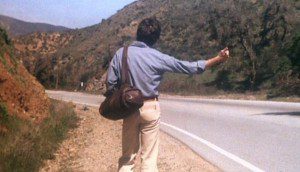I watched the premiere episode of NBC’s new show Believe last night, partly because of the involvement of some interesting people — J.J. Abrams, Alfonso Cuarón, Delroy Lindo — and partly because at this point I kind of feel sorry for NBC due to the network’s flailing attempts to find “the next Lost.”
Believe was, well, kind of unremarkably OK, I guess. Willa Paskin calls it a “cliché-ridden mess,” and she’s not wrong.
For all the show’s hints of shadowy conspiracies of good and evil and its portentous talk of “whoever controls her ability will control the world,” the first episode ended with the suggestion that this show may be something more conventional. “Think of all the people she’ll help along the way,” Lindo’s character says, laying out the likely structure of the series. Believe, it seems, is the latest return to the formula of a picaresque anthology series in which our heroes will, “You know, walk the Earth, meet people — get into adventures. Like Caine from Kung Fu.”
That’s promising. Yes, that format sometimes means, as Paskin says, “a cheeseball case of the week,” but when it’s done well, it can be a vehicle for terrific storytelling.
The show’s title — Believe — suggests religious overtones, and this wandering-do-gooder formula has often been a favorite for religiously themed shows. The fierce tribal loyalty of a religious audience can make a TV show a lasting hit, but it’s impossible to say yet whether Believe will appeal to that audience because we don’t yet know anything about the source of the supernatural powers displayed by the little girl at the heart of its story.
If cherubic little Bo turns out to be a literal cherub, then this show could become a huge hit. That’s probably true even if her powers are just vaguely attributed as a “miracle” or a “gift from God.” But if the source of her powers is explained in some kind of New Age-y way, or as a leap forward in human evolution, then that same religious audience will likely reject this show.
For a sense of what I mean, here’s a brief survey of some earlier TV shows that followed this wandering-hero format, in descending order of their appeal to religious audiences:
• Highway to Heaven (1984-1989). Pa Ingalls as an angel on a mission from God was more than enough to convince religious audiences to forget all about Michael Landon’s ugly divorce. The only downside was the show aired on Wednesday nights, when much of its potential audience was at prayer meeting.
 • Touched by an Angel (1994-2003). Before she became the virgin Mary, Roma Downey played an angel doing divine case-work. Supernatural levels of sappy schmaltz made this a huge hit.
• Touched by an Angel (1994-2003). Before she became the virgin Mary, Roma Downey played an angel doing divine case-work. Supernatural levels of sappy schmaltz made this a huge hit.
• The Millionaire (1955-1960). The main character was named “Michael,” but he wasn’t an angel serving as a messenger of God. He was, rather, the personal assistant of mysterious gazillionaire John Beresford Tipton, who sent Michael forth to rain $1 million checks upon the just and the unjust. But whether or not Tipton was, strictly speaking, divine, the fantasy of such miraculous providence was the same.
• The A-Team (1983-1987). The remnants of a “crack commando” unit did not possess the supernatural powers of angels or billionaires, but they did have a preternatural ability to spray bullets with no one ever getting shot. The show’s appeal to religious audiences was also enhanced by the casting of former bodyguard Nathaniel Tureaud — an outspoken born-again Christian and sometime evangelist who pities any fool who doesn’t know Jesus. More than 25 years later, “Mr. T” remains a popular figure in the evangelical subculture.
• The Fugitive (1963-1967). “Richard Kimble ponders his fate as he looks at the world for the last time, and sees only darkness. But in that darkness, fate moves its huge hand.” Talk of “fate” is, of course, not an acceptable substitute for talk of providence and God’s plan. On the other hand (no pun intended), Kimble’s quest to catch his wife’s killer could be seen as “pro-family.”
• The Incredible Hulk (1978-1982). David Banner was not an angel and he was not on a mission from God. He was, rather, a lonely man cursed by gamma radiation to become a green rage-machine. But if his supernatural powers were not divine, neither were they nefariously occult. And religious audiences, like everyone else, were willing to forgive the show’s shortcomings whenever they saw poor Bill Bixby walking down the highway to Joe Harnell’s mournful piano.
• Have Gun Will Travel (1957-1963). Westerns tend to embody the “traditional morality” that appeals to religious audiences, but this Paladin wasn’t quite their idea of lawful good. This black knight was a wine-drinking, urbane liberal who fought on the wrong side in the Civil War (i.e., the winning side, the American side, the anti-slavery side). That’s a far cry from Pa Ingalls as an angel.
• Kung Fu (1972-1975). Eastern philosophy is dangerous, grasshopper, a lie from the devil that lures good people away from the One True Truth.
• Route 66 (1960-1964). Restless, rootless youth hitting the highway in a search for meaning? There’s nothing at all angelic about that. This is where the 1960s came from — the beginning of the end for godly America. Plus most episodes didn’t take place on the iconic highway of the title, so why call the show that? Could it be because that’s just one digit away from you know what?
(Note: I’m only considering here shows with wandering heroes who travel from place to place. There are also a host of shows that employ a similar anthology formula, with similar supernatural overtones, but in a single setting — think Early Edition, Joan of Arcadia, or The Ghost Whisperer.)












